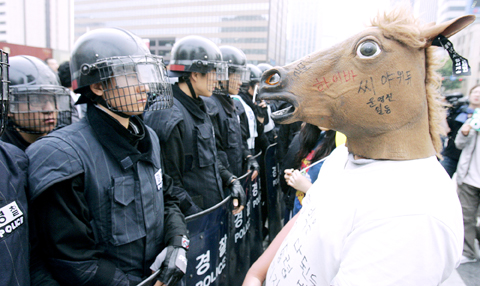South Korean President Lee Myung-bak said yesterday he was determined to make a “fresh start” after weeks of mass protests prompted his entire Cabinet to offer their resignations.
Some 100,000 demonstrators opposing the resumption of US beef imports and calling for Lee’s resignation packed central Seoul on Tuesday evening, the latest and largest in a month-long series of occasionally violent rallies.
Ahead of the protest, Lee’s Cabinet offered to quit to take responsibility for the political crisis which blew up less than four months into his presidency. Senior secretaries made a similar offer last week.

PHOTO: AP
“The government is determined to make a fresh start,” Lee was quoted by Yonhap news agency as telling officials and businessmen, expressing relief that Tuesday’s rallies in Seoul and other cities ended peacefully.
Yonhap interpreted the statement as indicating he would conduct a sweeping shakeup of his Cabinet and secretariat.
Protesters say US beef carries a risk of the human form of mad cow disease even though Seoul and Washington firmly deny this. Imports had been suspended in 2003 after a mad cow case.
But the rallies have also become a sounding box for a range of grievances against the conservative former business tycoon, whose popularity ratings have plummeted below 20 percent.
A semblance of normality returned to Seoul as police dispersed a few hundred remaining protesters early yesterday and dismantled barricades of shipping containers erected to keep demonstrators away from the presidential palace.
The conservative Chosun Ilbo daily said in an editorial that foreigners watching the rally must have thought “some kind of revolution” was taking place.
“The government is chiefly to blame,” it said, adding that officials had agreed to the resumption of US beef imports as a “lubricant” for Lee’s first summit with US President George W. Bush in April despite public sensitivity on the issue.
The government also alienated the public by filling key posts with “people only from among acquaintances, intimates, neighbors and people ideologically friendly to the president, making light of the moral standards of the majority,” it said.
Most newspapers called for an end to the protests, with JoongAng Ilbo declaring it was “time to calm down.” But there was also criticism of the new government’s record.
The Korea Herald said the Cabinet and presidential staff had displayed “collective incompetence” and, “therefore, the more extensive the replacements, the better.”
Seoul has sent officials to Washington to try to secure voluntary changes to the beef imports pact, but says it cannot renegotiate it, as protesters demand.
“If the government fails to accept the demand for renegotiation by June 20, we will stage a nationwide campaign to drive the government from power,” Park Won-suk, a leading activist, told reporters.
Choi Jin, chief of the Institute of Presidential Leadership, said the worst may be over in terms of protests.
“But the problems remain unsolved,” he said. “This crisis stems from a loss of public faith in Lee.”
The most important casualty of public distrust is likely to be Lee’s controversial canal project.
“I know how much people hate the canal project. I will make a bold decision if the people hate it so much,” Lee reportedly said.

China yesterday held a low-key memorial ceremony for the 1937 Nanjing Massacre, with Chinese President Xi Jinping (習近平) not attending, despite a diplomatic crisis between Beijing and Tokyo over Taiwan. Beijing has raged at Tokyo since Japanese Prime Minister Sanae Takaichi last month said that a hypothetical Chinese attack on Taiwan could trigger a military response from Japan. China and Japan have long sparred over their painful history. China consistently reminds its people of the 1937 Nanjing Massacre, in which it says Japanese troops killed 300,000 people in what was then its capital. A post-World War II Allied tribunal put the death toll

‘NO AMNESTY’: Tens of thousands of people joined the rally against a bill that would slash the former president’s prison term; President Lula has said he would veto the bill Tens of thousands of Brazilians on Sunday demonstrated against a bill that advanced in Congress this week that would reduce the time former president Jair Bolsonaro spends behind bars following his sentence of more than 27 years for attempting a coup. Protests took place in the capital, Brasilia, and in other major cities across the nation, including Sao Paulo, Florianopolis, Salvador and Recife. On Copacabana’s boardwalk in Rio de Janeiro, crowds composed of left-wing voters chanted “No amnesty” and “Out with Hugo Motta,” a reference to the speaker of the lower house, which approved the bill on Wednesday last week. It is

FALLEN: The nine soldiers who were killed while carrying out combat and engineering tasks in Russia were given the title of Hero of the Democratic People’s Republic of Korea North Korean leader Kim Jong-un attended a welcoming ceremony for an army engineering unit that had returned home after carrying out duties in Russia, North Korean state media KCNA reported on Saturday. In a speech carried by KCNA, Kim praised officers and soldiers of the 528th Regiment of Engineers of the Korean People’s Army (KPA) for “heroic” conduct and “mass heroism” in fulfilling orders issued by the ruling Workers’ Party of Korea during a 120-day overseas deployment. Video footage released by North Korea showed uniformed soldiers disembarking from an aircraft, Kim hugging a soldier seated in a wheelchair, and soldiers and officials

Cozy knits, sparkly bobbles and Santa hats were all the canine rage on Sunday, as hundreds of sausage dogs and their owners converged on central London for an annual parade and get-together. The dachshunds’ gathering in London’s Hyde Park came after a previous “Sausage Walk” planned for Halloween had to be postponed, because it had become so popular organizers needed to apply for an events licence. “It was going to be too much fun so they canceled it,” laughed Nicky Bailey, the owner of three sausage dogs: Una and her two 19-week-old puppies Ember and Finnegan, wearing matching red coats and silver